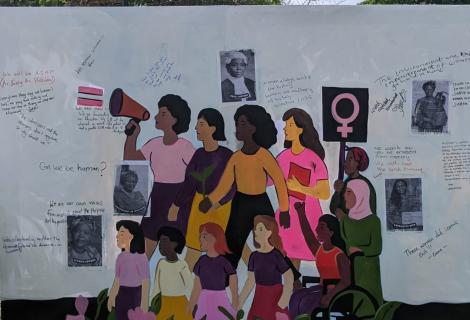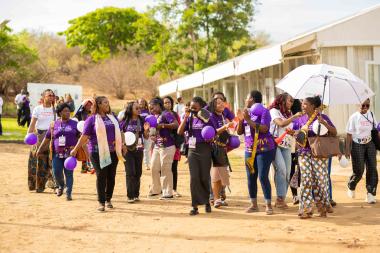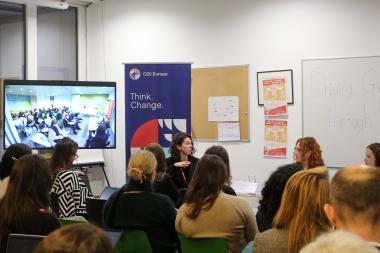International Day for the Elimination of Violence against Women: fund feminist futures now!

In a year marked by drastic aid cuts, an ongoing genocide and violent conflicts, and global backlash on gender equality, ActionAid called for a Global Month for Feminist Solidarity and Action between November and December to preserve a feminist space for care, celebration and connection. We are gathering to celebrate wins of the global feminist movement at the end on the Beijing +30 anniversary and have spaces for solidarity and reflections for how to move forwards: stronger, united, unapologetic.
From Malawi to Ukraine, the message is clear: fund feminist futures!
In a series of in-person and online events, bringing together feminist activists from several regions and contexts, different voices share the same message: we need long-term, flexible and accessible funding for Women Rights Organizations (WROs) and feminist movements globally.
During the Forum for Feminist Solidarity, Organizing and Leadership held in Salima, Malawi on November 12th, several activists from the Young Urban Women movement from Ghana, Kenya, South Africa and Malawi denounced how the legacies of colonialism are perpetrating an unjust global financial system and gender norms that shape the lived realities of young women and girls in Africa today.

‘We don’t want a negotiation – we want a complete overhaul’. That’s the key message shared by the young feminist activists: an overhaul of all systems of oppressions, from coloniality, capitalism and patriarchy that push women into informal, precarious and unsafe spaces in our societies. And in a context of chronic underfunding to WROs and feminist movements, the question of budgets is more urgent than ever.
The same message comes from the women who are at the frontline of the humanitarian response in conflict situations. “Resistance is not only about surviving the war – it’s about defending dignity, rights, and the power to decide our futures” said Iryna Koval, Women’s Rights Advisor at ActionAid Ukraine during an event on gender equality in the EU accession process. In Ukraine as in other conflicts, women’s movements have stood at the frontline of both crisis response and democratic transformation, carrying out a deeply transformative work that is anchored in the communities they come from.

But WROs and feminist organisations remain critically underfunded. Globally, less than 1% ODA earmarked for gender equality is going to WROs while the anti-gender movement receives massive funding (in Europe alone, estimates talk about US$1.18 billion between 2019 and 2023 going to the anti-rights and anti-gender movements).[1] Recent data released by UN Women found that one out of three surveyed WROs and CSOs have suspended or shut down programmes aimed at ending gender-based violence, due to aid cuts. “In Ukraine” adds Iryna “nearly three-quarters of surveyed WROs reported major operational disruptions, and more than 60% were forced to reduce or suspend GBV programmes”.
Feminist futures start from concrete commitments: the EU Budget
While the call from civil society and feminist movements is clear, the policy response is lacking. In July 2025, the European Commission presented its proposal for the next long-term EU budget (Multi-Annual Financial Framework) including the budget for its external action, Global Europe.[2]
The proposal severely dilutes gender equality commitments, as gender equality is now included in a broad mainstreaming approach, which erases previously existing spending targets. The current goal is for 85% of projects to have gender equality as a principal or significant objective, and for 5% for actions to have gender equality and women’s and girls’ rights and empowerment as principal objectives. The lack of targets can jeopardise and decrease the financial commitment to the promotion of gender equality and women’s rights globally, in a geopolitical context where we see rising shrinking civic space, anti-gender movement and aid cuts which impact women and girls the most. At the same time, this can also lead to even less funding going to local WROs.
As negotiations on the next EU long-term budget are starting now, this is a crucial moment to be united as civil society and feminist movements to demand the EU to step up its political and financial commitments to the promotion of gender equality globally, and to make funding accessible to local feminist and grassroots organisations.
“Feminist resistance” concludes Iryna, “does not only mean resisting war and occupation, but also resisting marginalization, donor conditionalities, and systems that often fail to recognize women’s leadership.”
[1] https://www.epfweb.org/node/1152
[2] https://actionaid.org/publications/2025/more-money-less-vision-global-europe-risks-turning-partnerships-political-2